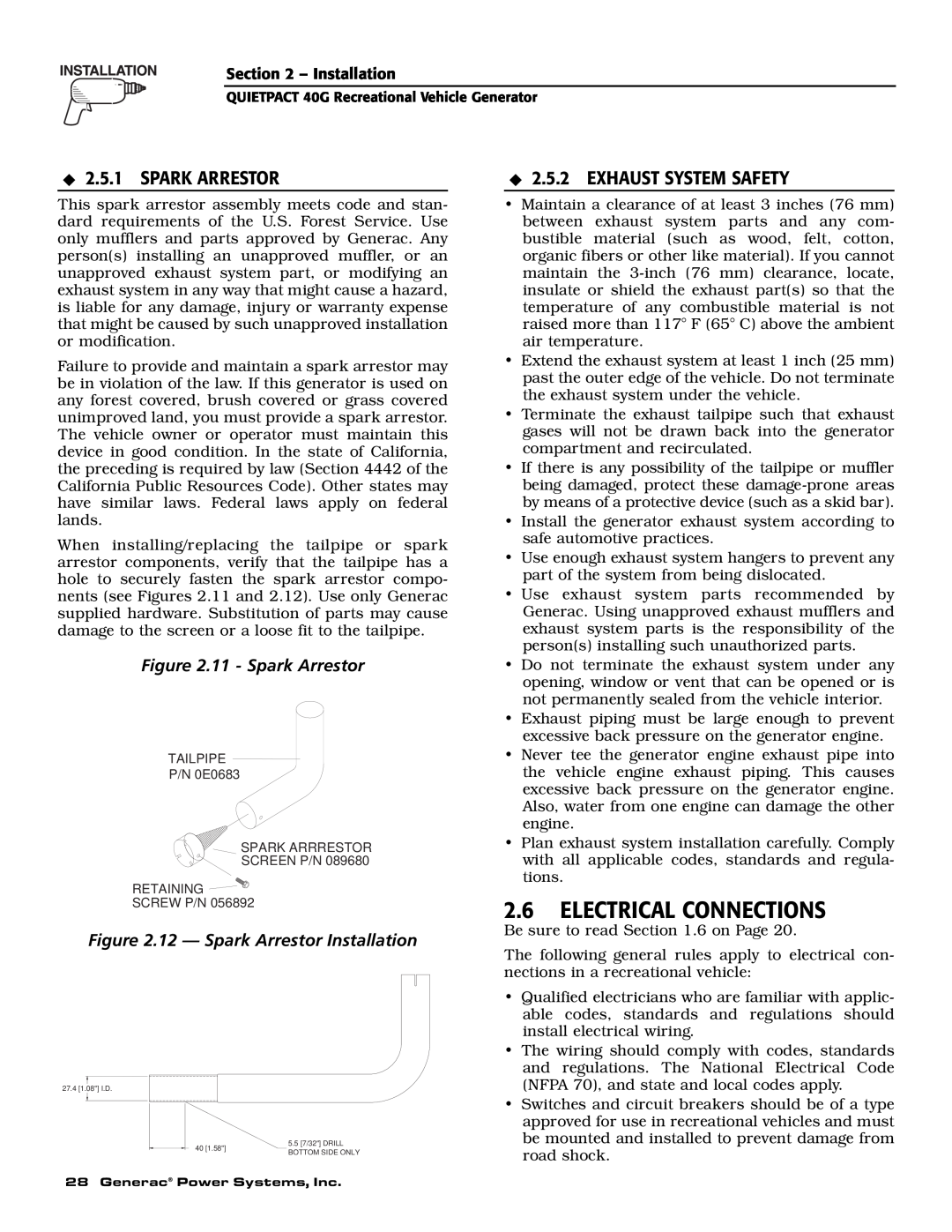Model QUIETPACT 40G
Air-cooled Recreational Vehicle Generators
This manual should remain with the unit
GENERA OHVI
OPERATION AND MAINTENANCE
AUTHORIZED SERVICE DEALER LOCATION
CONTENTS
HOW TO OBTAIN SERVICE
Adjustments
Part II - Installation Instructions
Safety Rules
Exploded Views and Parts Lists
Parts of the generator are rotating and/or hot
GENERAL HAZARDS
Despite the safe design of this generator
during operation. Exercise care near running generators
ELECTRICAL HAZARDS
FIRE HAZARDS
EXPLOSION HAZARDS
Model Number
1.1 GENERATOR IDENTIFICATION
Model 004700-0 - QUIETPACT 40G
kW Rating
Do not overload the generator. Some installa
1.3 SAFETY
1.5 SPECIFICATIONS
1.2 GENERATOR APPLICABILITY
1.5.2 FUEL CONSUMPTION
Generac does not recommend using any
1.5.5 GENERATOR
1.5.3 ENGINE OIL REQUIREMENTS
2.1 GENERATOR CONTROL PANEL
2.1.2 START/STOP SWITCH
2.4.1 INSTALLATION
2.2 OPTIONAL REMOTE START/STOP PANEL
2.4.3 FUEL SUPPLY
2.5 STARTING THE GENERATOR
2.4.2 ENGINE LUBRICATION
2.4.4 COOLING AND VENTILATING AIR
Figure 2.2 - Low Oil Pressure and High Temperature Switches
2.9.1 LOW OIL PRESSURE SWITCH
2.9.2 HIGH TEMPERATURE SWITCH
2.6 STOPPING THE GENERATOR
2.10.1 25-HOUR BREAK-IN PERIOD
2.10 ADDITIONAL INFORMATION
2.9.3 FIELD BOOST
2.9.4 OVERVOLTAGE PROTECTION
3.2 CHANGING THE ENGINE OIL AND/OR OIL FILTER
Figure 3.1 - Oil Maintenance Features
3.1 CHECKING THE ENGINE OIL LEVEL
2.10.4 OPERATION IN HIGH GRASS OR BRUSH
Figure 3.2 - Engine Air Cleaner
3.3 MAINTAINING THE ENGINE AIR CLEANER
3.3.1 CLEANING THE FOAM PRECLEANER
3.3.2 CLEANING OR REPLACING THE PAPER FILTER
Figure 3.3 - Cleaning Air Intake
3.4 CLEAN AIR INTAKE
3.7 CLEAN SPARK ARRESTOR
Figure 3.4 - Setting the Spark Plug Gap
Do NOT use a forceful spray of water to clean
3.8 CLEANING THE GENERATOR
3.9 BATTERY MAINTENANCE
Use tools with insulated handles Wear rubber gloves and boots
3.12.1 REMOVAL FROM SERVICE
3.12 OUT OF SERVICE PROCEDURE
3.13 ADJUSTING VALVE CLEARANCE
3.12.2 RETURN TO SERVICE
3.14 RV GENERATOR SERVICE INTERVAL
Figure 3.8 - Tightening Jam Nut
PART
INSTALLATION INSTRUCTIONS
SHOULD ATTEMPT INSTALLATION
ONLY QUALIFIED ELECTRICIANS OR CONTRACTORS
NOTICE TO INSTALLER
FIRE HAZARDS
1.4 EQUIPMENT DESCRIPTION
1.2 SAFETY
1.1 PURPOSE AND SCOPE OF THE MANUAL
1.5 GENERATOR ENGINE OPERATING SPEED
Major Features
VIEW FROM TOP
2.1.2 GENERATOR SUPPORT
2.1 LOCATION AND SUPPORT
2.1.1 GENERATOR LOCATION
2.1.3 SUSPENDED MOUNTING
2.2.2 COMPARTMENT CONSTRUCTION
2.2 GENERATOR COMPARTMENTS
2.1.4 GENERATOR RESTRAINT
2.2.1 COMPARTMENT SIZE
2.2.4 ACOUSTICS
2.2.3 SOUND INSULATING MATERIALS
Figure 2.6 - Types of Lock Seams
VIEW FROM TOP
Figure 2.7 - Typical Noise Abatement 2.2.5 COMPARTMENT FLOOR CUTOUTS
Figure 2.8 - Compartment Floor Cutout Drawing 0D8716-C
All measurements are in millimeters, 25.4 mm = 1”
2.4 GASOLINE FUEL SYSTEM
2.3.2 TESTING THE INSTALLATION
2.3 COOLING AND VENTILATING AIR
2.3.1 GENERATOR AIRFLOW
2.4.2.2 Flexible Fuel Line
2.5 EXHAUST SYSTEM
2.4.1 FUEL TANK
2.4.2 GENERATOR FUEL SUPPLY LINE 2.4.2.1 Rigid Fuel Lines
2.6 ELECTRICAL CONNECTIONS
2.5.2 EXHAUST SYSTEM SAFETY
Figure 2.12 - Spark Arrestor Installation
2.5.1 SPARK ARRESTOR
2.6.3 GENERATOR AC CONNECTIONS
2.6.2 WIRING
2.6.1 ELECTRICAL JUNCTION BOX
2.6.4 CONDUIT
2.6.5 ISOLATING DIFFERENT POWER SOURCES
2.6.6 POWER SUPPLY CORD
Figure 2.14 - Transfer Switch Isolation Method
2.7.1 RECOMMENDED BATTERY
2.7 BATTERY INSTALLATION
2.8 OPTIONAL ACCESSORIES
2.7.2 BATTERY CABLES
Do not make any unnecessary adjustments
3.1 POST INSTALLATION TESTS
3.4 TESTING UNDER LOAD
3.2 BEFORE INITIAL START-UP
3.5 INSTALLATION CHECKLIST
Appendix 1 - Notes
34 Generac Power Systems, Inc
CAUSE
TROUBLESHOOTING GUIDE
PROBLEM
CORRECTION
Appendix 3 - Electrical Data
36 Generac Power Systems, Inc
BROWN
QUIETPACT
Data
Power
Appendix 3 - Electrical
Enclosure - Drawing No. 0D8352-E
38 Generac Power Systems, Inc
Appendix 4 - Exploded Views and Parts Lists
TO CARB
Appendix 4 - Exploded Views and Parts Lists
PART NO. QTY
DESCRIPTION
40 Generac Power Systems, Inc
Appendix 4 - Exploded Views and Parts Lists
42 Generac Power Systems, Inc
25 24
Appendix 4 - Exploded Views and Parts Lists
44 Generac Power Systems, Inc
ASSEMBLY, GOVERNOR LEVER
ASSEMBLY BRACKET GOVERNOR
BOOT CHOKE SOLENOID PLASTIC
GASKET CARBURETOR/MANIFOLD
46 Generac Power Systems, Inc
VALVE SPRING WEAR WASHER
TAPERED CRANKSHAFT ASSEMBLY
SCREW, HHFC M8-1.25 X 35MM
OIL PRESSURE RELIEF COVER
MANUFACTURER’S EMISSION CONTROL SYSTEM WARRANTY COVERAGE
CALIFORNIA AND FEDERAL EMISSION CONTROL WARRANTY STATEMENT
YOUR WARRANTY RIGHTS AND OBLIGATIONS
PURCHASER’S/OWNER’S WARRANTY RESPONSIBILITIES
1 Utility 2 Lawn and Garden Equipment
EMISSION CONTROL SYSTEM WARRANTY
EMISSION RELATED PARTS INCLUDE THE FOLLOWING
3 Recreational Vehicle RV Generator 4 Industrial Mobile IM Generator
WARRANTY SCHEDULE - CONSUMER/PERSONAL APPLICATIONS
GENERAC POWER SYSTEMS’ THREE-YEAR LIMITED WARRANTY
WARRANTY SCHEDULE - COMMERCIAL APPLICATIONS
GENERAC POWER SYSTEMS, INC
